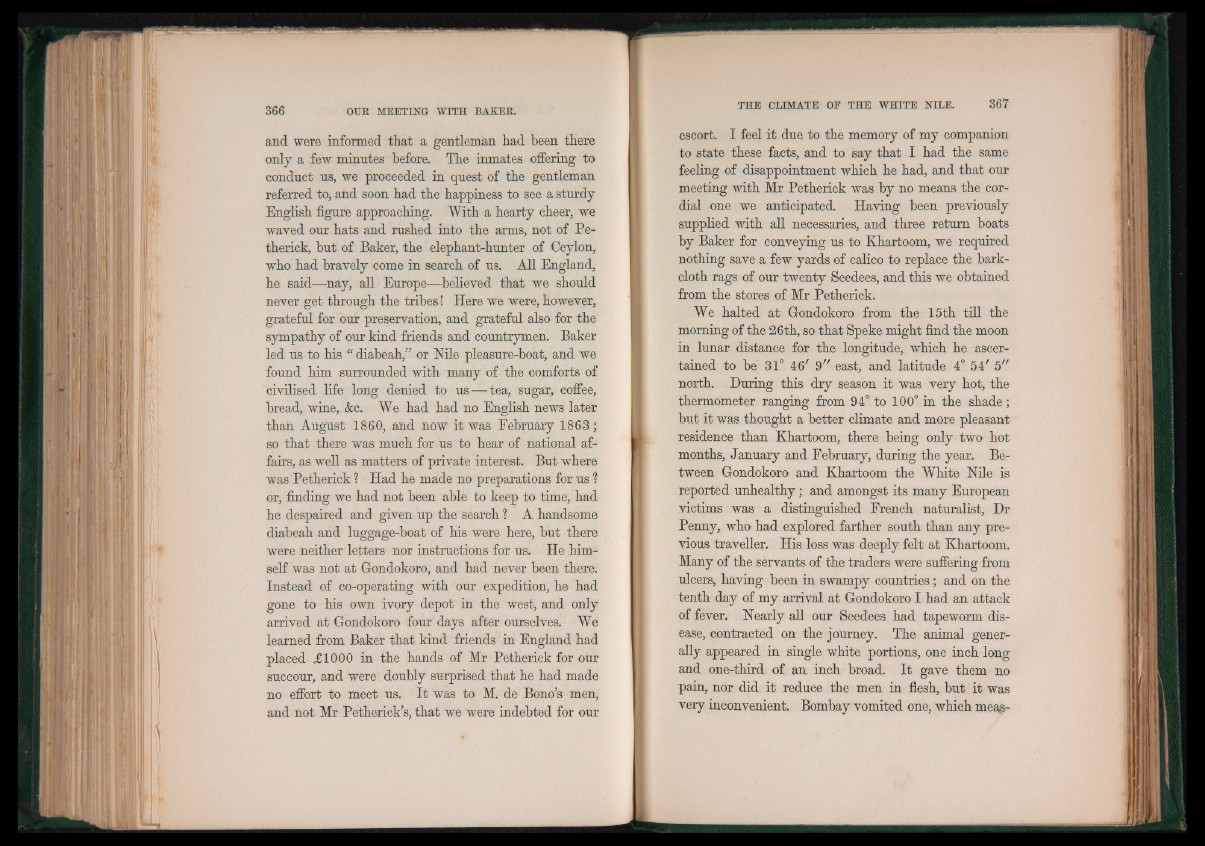
and were informed that a gentleman had been there
only a few minutes before. The inmates offering to
conduct us, we proceeded in quest of the gentleman
referred to, and soon had the happiness to see a sturdy
English figure approaching. With a hearty cheer, we
waved our hats and rushed into the arms, not of Petherick,
hut of Baker, the elephant-hunter of Ceylon,
who had bravely come in search of us. All England,
he said—nay, all Europe—believed that we should
never get through the tribes! Here we were, however,
grateful for our preservation, and grateful also for the
sympathy of our kind friends and countrymen. Baker
led us to his “ diabeah,” or Nile pleasure-boat, and we
found him surrounded with many of the comforts of
civilised life long denied to us — tea, sugar, coffee,
bread, wine, &c. We had had no English news later
than August 1860, and now it was February 1863;
so that there was much for us to hear of national affairs,
as well as matters of private interest. But where
was Petherick ? Had he made no preparations for us ?
or, finding we had not been able to keep to time, had
he despaired and given up the search ? A handsome
diabeah and luggage-boat of his were here, but there
were neither letters nor instructions for us. He himself
was not at Gondokoro, and had never been there.
Instead of co-operating with our expedition, he had
gone to his own ivory depot in the west, and only
arrived at Gondokoro four days after ourselves. We
learned from Baker that kind friends in England had
placed £1000 in the hands of Mr Petherick for our
succour, and were doubly surprised that he had made
no effort to meet us. I t was to M. de Bono’s men,
and not Mr Petherick’s, that we were indebted for our
escort. I feel it due to the memory of my companion
to state these facts, and to say that I had the same
feeling of disappointment which he had, and that our
meeting with Mr Petherick was by no means the cordial
one we anticipated. Having been previously
supplied with all necessaries, and three return boats
by Baker for conveying us to Khartoom, we required
nothing save a few yards of calico to replace the bark-
cloth rags of our twenty Seedees, and this we obtained
from the stores of Mr Petherick.
We halted at Gondokoro from the 15th till the
morning of the 26 th, so that Speke might find the moon
in lunar distance for the longitude, which he ascertained
to be 31° 46' 9" east, and latitude 4° 54' 5"
north. During this dry season it was very hot, the
thermometer ranging from 94° to 100° in the shade;
but it was thought a better climate and more pleasant
residence than Khartoom, there being only two hot
months, January and February, during the year. Between
Gondokoro and Khartoom the White Nile is
reported unhealthy; and amongst its many European
victims was a distinguished French naturalist, Dr
Penny, who had explored farther south than any previous
traveller. Eds loss was deeply felt at Khartoom.
Many of the servants of the traders were suffering from
ulcers, having been in swampy countries; and on the
tenth day of my arrival at Gondokoro I had an attack
of fever. Nearly all our Seedees had tapeworm disease,
contracted on the journey. The animal generally
appeared in single white portions, one inch long
and one-third of an. inch broad. It gave them no
pain, nor did it reduce the men in flesh, but it was
very inconvenient. Bombay vomited one, which mea$-